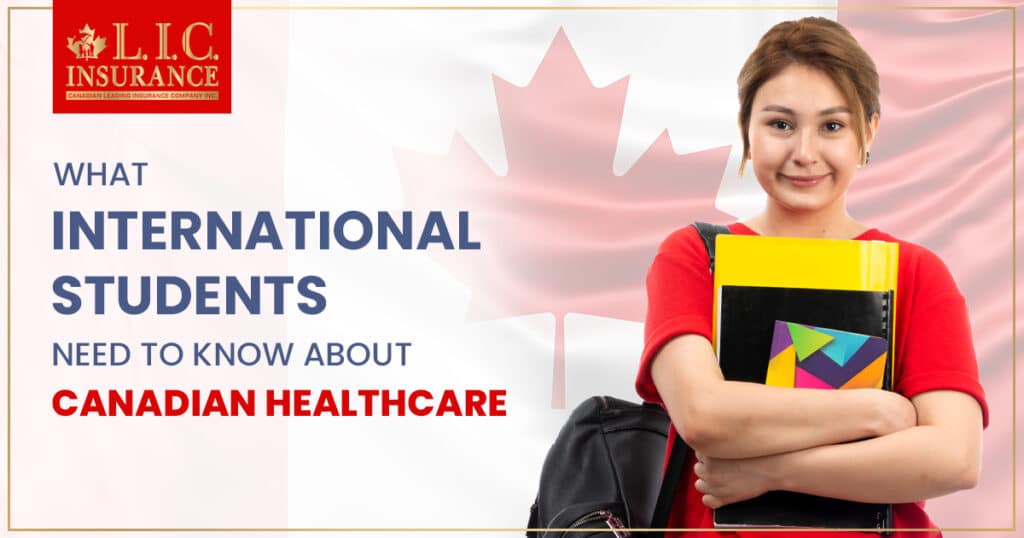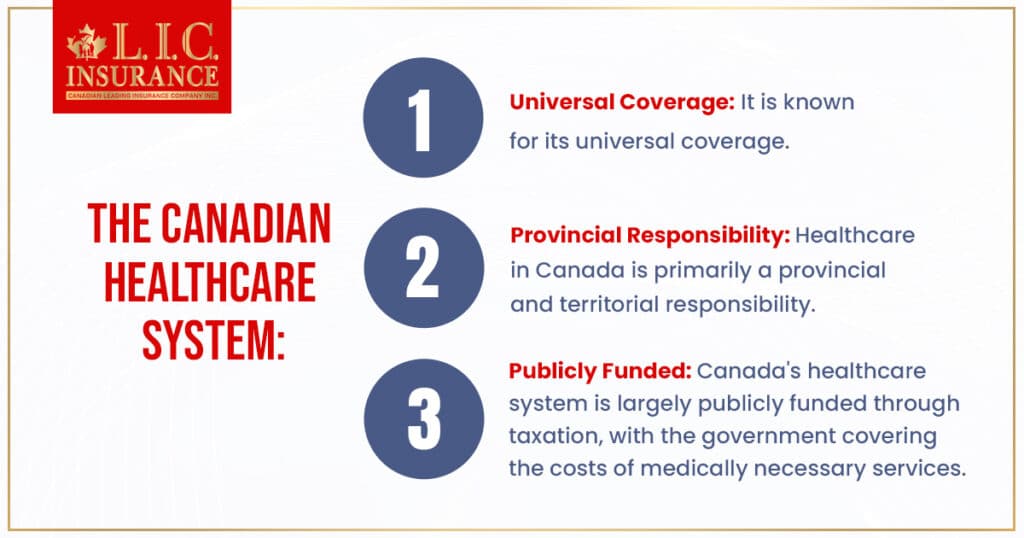
October 10, 2023, ,
Studying abroad is an exciting and life-changing experience, but it also comes with various challenges and responsibilities. One of the most important aspects of living and studying in a foreign country like Canada is understanding the healthcare system. As an international student, you need to be aware of how Canadian healthcare works, what services are available to you, and how to access them. So here, you will get everything international students need to know about Canadian healthcare, ensuring that you can stay healthy and well-informed during your time in Canada.

Canada’s healthcare system is often regarded as one of the best in the world, known for its accessibility and high-quality care. It is publicly funded, which means that eligible residents, including international students with valid study permits, can access medically necessary services without directly paying for them at the point of care.
The Canadian healthcare system is administered at both federal and provincial/territorial levels, which can lead to some variations in coverage and services across different provinces. Therefore, it’s essential to understand the healthcare system in the specific province where you are studying.
International students in Canada typically require private health insurance, at least during the initial waiting period, before becoming eligible for provincial healthcare coverage. Here are some key points to consider regarding health insurance:
a. Mandatory Health Insurance: Many provinces require international students to have health insurance, and some educational institutions have their own insurance plans. Be sure to check your province’s specific requirements.
b. Waiting Period: There is usually a waiting period before you become eligible for provincial healthcare. During this time, private health insurance is essential to cover your medical needs.
c. Provincial Healthcare: Once you become eligible, you can apply for provincial healthcare coverage, which will provide you with essential medical services.
Canadian provinces and territories provide essential healthcare services through their provincial healthcare plans. Here are some key aspects of provincial healthcare coverage:
a. Medical Services: Provincial healthcare plans cover essential medical services, including doctor’s visits, hospital stays, diagnostic tests, and emergency care.
b. Health Card: To access provincial healthcare services, you will need to apply for a provincial health card. The process varies by province, so make sure to inquire about the specific requirements in your area.
c. Coverage Variations: While the core services are consistent across Canada, there may be variations in coverage, and some services may not be fully covered. Understanding the specifics of your provincial plan is crucial.
Private health insurance is essential for international students, especially during the waiting period before provincial coverage begins. Here are some important considerations:
a. Coverage Options: There are various private health insurance plans available to international students, and you should choose one that suits your needs and budget. These plans can cover services like prescription medications, dental care, and vision care, which may not be fully covered by provincial plans.
b. Insurance Providers: Research and compare insurance providers to find the most suitable plan. Many educational institutions have partnerships with insurance companies, offering plans tailored to the needs of international students.
c. Costs: The cost of private health insurance can vary depending on the coverage and the province where you are studying. It’s essential to budget for this expense when planning your studies in Canada.
Canadian healthcare services are of high quality and accessible to all residents. Here are some key aspects of healthcare services you should be aware of:
If you require prescription medications, it’s important to understand how the system works in Canada:
Provincial healthcare plans do not typically cover dental and vision care services. International students often rely on private health insurance for these services. Here’s what to know:
Staying up-to-date with immunizations and preventive care is vital for your health. Here are some key points to consider:
Canadian universities and colleges often provide a range of health and wellness resources for students:
Emergencies and After-Hours Care
In case of medical emergencies or after-hours care needs, here’s what to do:
Read More – What kind of Medical Health Insurance do International Students Need?
It is required by law that all international students studying in Canada should have health insurance. Under the provincial plan for most regions, they will provide international students with health coverage, but most do not. All Canadian territories and provinces offer free emergency healthcare for students who do not have a government health card, but these services are restricted.
It can be a costly affair if you do not possess health insurance and are not eligible for health care. You may be required only to pay CAD 120 to see a doctor at a walk-in clinic with insurance. If you do not have a health insurance plan, you can pay a bill upwards of CAD 1,000 for an emergency room visit and CAD 3,700 for acute care in a standard ward. You will be required to pay for your medical expenses upfront wherever you go for treatment. No individual wishes to fall ill, but in the unfortunate event you do fall sick, you can end up spending thousands of dollars for a medical emergency.
Canada has long been a top destination for international students seeking a high-quality education, cultural diversity, and a safe and welcoming environment. Studying in Canada offers a unique opportunity for personal and academic growth. However, planning for international education can be complex and overwhelming. So we also bring here some tips for you that will make everything way easier:
Research Your Program and Institution: The first step in your journey to study in Canada is thorough research. Selecting the right program and institution is crucial to your academic and personal success.
Understand Visa and Immigration Requirements: Navigating Canada’s immigration requirements is a crucial part of studying in the country. Ensure that you understand the visa and immigration processes specific to international students.
Financial Planning: Studying abroad can be expensive, so careful financial planning is essential to ensure you have the resources you need throughout your academic journey.
Health Insurance: Health insurance is essential during your stay in Canada. Make sure you have the right coverage to protect your health and well-being.
Accommodation: Arranging suitable accommodation is a critical part of your transition to Canada. Begin your search early to secure safe and comfortable housing.
Cultural Adjustment: Adjusting to a new culture can be challenging, but it’s also an opportunity for personal growth and cultural enrichment.
Academic Preparation: Preparing academically is essential for success in your Canadian studies. Develop effective study habits and time management skills.
Stay Informed About Work Regulations: As an international student in Canada, you may be eligible to work part-time while studying and full-time during scheduled breaks. Understanding these regulations is essential.
Safety and Emergency Contacts: Canada is generally considered a safe country, but it’s essential to be aware of safety precautions and emergency contacts.
Stay Connected with Home: Maintaining connections with family and friends back home can provide valuable emotional support during your time abroad.
Studying in Canada is a remarkable opportunity for international students to expand their horizons and gain a world-class education. By thoroughly researching your program and institution, understanding visa requirements, planning financially, and being well aware of the Canadian healthcare system, you can set yourself up for a successful academic journey. Additionally, preparing for cultural adjustment, academic success, and compliance with work regulations will ensure a smooth transition to life in Canada.
Remember that your experience as an international student is not only about academics but also about personal growth and cultural enrichment. Embrace the adventure, seek support when needed, and make the most of your time studying in Canada. With careful planning and a positive mindset, your international education in Canada can be a truly transformative experience.
Read More – Guide To International Student Insurance
Understanding the Canadian healthcare system is essential for international students studying in Canada. By familiarizing yourself with the healthcare services available, securing the necessary health insurance, and staying proactive about your health and well-being, you can ensure a safe and enjoyable experience during your time as an international student. Remember to keep your health card, insurance documents, and contact information for healthcare providers.
Contact the team at Canadian LIC today!
At Canadian LIC, we ensure that international students’ health insurance plans include a doctor visit, ambulance and emergency medical care, hospital stay, and diagnostic testing. A few plans include dental and eye care.
For further information, do not hesitate to give us a call at 1 844-552-4678.
The above information is only meant to be informative. It comes from Canadian LIC's own opinions, which can change at any time. This material is not meant to be financial or legal advice, and it should not be interpreted as such. If someone decides to act on the information on this page, Canadian LIC is not responsible for what happens. Every attempt is made to provide accurate and up-to-date information on Canadian LIC. Some of the terms, conditions, limitations, exclusions, termination, and other parts of the policies mentioned above may not be included, which may be important to the policy choice. For full details, please refer to the actual policy documents. If there is any disagreement, the language in the actual policy documents will be used. All rights reserved.
Please let us know if there is anything that should be updated, removed, or corrected from this article. Send an email to [email protected] or [email protected]